-
In Uganda, First Trip for Journalists Bolsters International Reporting
›March 24, 2009 // By Will Rogers U.S. journalists “are by and large dying for the opportunity to go overseas and learn about a whole range of issues, from refugees to human rights,” but often lack the support of their editors—the “gatekeepers”—to do so, said Louise Lief, deputy director of the International Reporting Project (IRP), at a February 26, 2009, event, “Reporting From Uganda: U.S. Media Cover Health, Environment, and Security.” Leif was joined by Paul Hendrie, department editor at Congressional Quarterly (CQ); David Rocks, senior editor at BusinessWeek; and Ben de La Cruz, a staff video journalist at The Washington Post, to discuss the recent IRP Gatekeeper trip to Uganda.
U.S. journalists “are by and large dying for the opportunity to go overseas and learn about a whole range of issues, from refugees to human rights,” but often lack the support of their editors—the “gatekeepers”—to do so, said Louise Lief, deputy director of the International Reporting Project (IRP), at a February 26, 2009, event, “Reporting From Uganda: U.S. Media Cover Health, Environment, and Security.” Leif was joined by Paul Hendrie, department editor at Congressional Quarterly (CQ); David Rocks, senior editor at BusinessWeek; and Ben de La Cruz, a staff video journalist at The Washington Post, to discuss the recent IRP Gatekeeper trip to Uganda.
President Museveni’s Surprising Views
“One of the advantages of these trips is when you go with a critical mass of 12 very senior editors…you can often get in to see the head of state,” said Leif, describing the group’s sit-down interview with President Yoweri Museveni of Uganda. One “big surprise for me was President Museveni’s views on population,” which he did not consider a challenge, said Lief, despite the country’s high total fertility rate of 6.7 children per woman.
She was heartened that the country’s poor infrastructure, including bad roads and unreliable electricity, did not deter Ugandan children from obtaining an education. “All along the road in brightly colored clothing there were thousands and thousands of children,” she said. “Some of them were walking for kilometers, but they were going to school.”
Organic Farmers Fight DDT in Uganda
“These things that we deal with in Washington every day have a real impact in the real world,” said CQ’s Paul Hendrie. He wrote a story on the Ugandan debate over using the pesticide DDT to combat the country’s significant malaria problem. “As one expert put it to me, ‘Farmers love DDT because it kills everything,’ and that’s why it was so popular”—and why it was banned in the United States.
“Uganda has developed an industry, a fledgling industry, of certified organic farmers. They’re the leading organic exporter in Africa and thirteenth in the world,” explained Hendrie. Farmers are concerned “that if traces of DDT are found in these products, they’ll be shut out of markets, especially in Europe, their biggest market.”
“It’s kind of ironic then that in Uganda now, today, the fight against the use of DDT is not being so much led by environmentalists as by farmers, and specifically organic farmers,” Hendrie noted.
Investigating Uganda’s Economy “In a developing country, what is it that moves people, that makes the economy grow?” BusinessWeek’s David Rocks wondered before visiting Uganda.
“In a developing country, what is it that moves people, that makes the economy grow?” BusinessWeek’s David Rocks wondered before visiting Uganda.
“One of the companies that struck me was Kiwi Shoe Polish,” he said. Many people keep their shoes “for 10 or 15 years, so you have to keep them shined and polished and in good shape in order to use them.” But Chinese companies have begun counterfeiting the polish, causing Kiwi’s sales to plummet 50 percent in the last year. “It’s the poorest of the poor who are getting ripped off,” he said.
“I think that there is a lot of room for interesting economic and business stories to be done from Africa,” said Rocks, who is a senior editor at the magazine. “I hope to get my people to do more and more of that.”
Seeds of Peace in the IDP Camps
“The focus of my reporting was basically on security issues in the north, in the Gulu region, where there’s been a 20-year civil war,” said Ben de la Cruz, who filmed several videos for The Washington Post documenting the dangers of life in Uganda’s internally displaced persons (IDP) camps. In the online multimedia presentation “Seeds of Peace,” IDPs tell their wrenching stories, and peace mediator (and former Wilson Center Scholar) Betty Bigombe provides historical and political context on Uganda’s civil war.
“Despite the two years of relative peace, lots of people are still living in the camps and are afraid to leave,” de la Cruz explained. “There’s a huge fear factor because of Joseph Kony’s rebels—even though they had a ceasefire, they’re always afraid he’s going to come back.”Photos: From top to bottom: Louis Lief, Paul Hendrie, David Rocks, and Ben de la Cruz. Courtesy of Dave Hawxhurst and the Woodrow Wilson Center.
-
Water a National Security Issue, Says Senator Richard Durbin
›March 20, 2009 // By Will Rogers “Water access is no longer simply a global health and development issue; it is a mortal and long-term threat that is increasingly becoming a national security issue,” said Senator Richard Durbin at a March 17, 2009, event on Capitol Hill. Introducing the Paul Simon Water for the World Act of 2009, Senator Durbin called for renewed American leadership on the global water crisis plaguing billions around the world.
“Water access is no longer simply a global health and development issue; it is a mortal and long-term threat that is increasingly becoming a national security issue,” said Senator Richard Durbin at a March 17, 2009, event on Capitol Hill. Introducing the Paul Simon Water for the World Act of 2009, Senator Durbin called for renewed American leadership on the global water crisis plaguing billions around the world.
“The United States needs to do much more to ensure that global water access is protected and expanded,” he said. Senator Durbin’s remarks come on the heels of the Fifth Global Water Forum held in Istanbul, Turkey this week, and precede UN World Water Day on March 22, 2009.
“The global water crisis is a quiet killer,” Durbin said. “In the developing world, 5,000 children die every day from easily preventable water-related illnesses such as cholera, typhoid, and malaria, diseases that have been all but eradicated in wealthier nations.”
The Water for the World Act of 2009 expands a commitment from the earlier Paul Simon Water for the Poor Act of 2005, which has had notable success in focusing U.S. aid on water-related assistance. From 2007-2008, for instance, the U.S. helped provide 2 million people with access to an improved source of drinking water and more than 1.5 million people to improved sanitation.
But these efforts need to be scaled up to reach the billions of people without clean water. According to Representative Earl Blumenauer, speaking at the same event, there are more people in the world today without access to adequate sanitation than the populations of China and India combined. The Water for the World Act of 2009 will seek to provide “100 million people around the world with sustainable access to clean water and sanitation by 2015,” said Durbin.
In addition, if passed, the act will make water a development priority for U.S. foreign assistance and “designates within the State Department a high-level representative to ensure that water receives priority attention in our foreign policy, and establishes a new Office of Water at USAID to implement development assistance efforts related to water,” Durbin said.
Access to clean water and adequate sanitation is a cornerstone for sustainable development around the world. Developing countries will not be able to build their economies or bring their resources to fruition if people in these countries have to travel for hours to find water, or are “too sick from drinking unsafe water, to work or to go to school,” Durbin warned.
Improving access to safe water will not only reduce mortality from waterborne illness, but will help provide long-term stability in countries that suffer from population pressures due large population growth from high total fertility rates. In developing countries, 3,900 children under 5 years old die every day from waterborne illness. “Mothers who fear the deaths of their children bear more, in a desperate race against the odds,” said Senator Durbin. While access to education and family planning programs is also essential to reducing high fertility rates in developing countries, so too is basic access to safe drinking water and sanitation.
But funding for water infrastructure and sanitation programs is just the first step. In developing countries, poor governance is a major roadblock to implementing successful development projects. Unregulated privatization of water can prevent the “voiceless and powerless” poor from gaining access to the water services they need, Durbin cautioned.
To address the challenges of governance, the bill will help “build the capacity of poor nations to meet their own water and sanitation challenges,” Durbin said, by providing “technical assistance, best practices, credit authorities, and training to help countries expand access to clean water and sanitation.”
Working to ensure access to safe water and adequate sanitation can help implement the “smart power” strategy the U.S. desperately needs during a period when the world is redefining America – a strategy to help provide “things people and governments in all quarters of the world want but cannot attain in the absence of American leadership,” writes the Center for Strategic and International Studies (CSIS) Commission on Smart Power.
CSIS President John Hamre said the U.S. should re-establish its moral leadership in the world by making a serious commitment to increasing access to clean water and adequate sanitation. CSIS recently issued a Declaration on U.S. Policy and the Global Challenge of Water, endorsed by more than 35 leaders in business, government, and academia, and called on President Obama “to launch a bold new U.S. campaign to address the global challenge of water.”
“Throughout history, civilized nations have put aside political differences to address compelling issues of life and survival,” said Senator Durbin. “Our generation owes the world nothing less.”
Photo: Senator Richard Durbin. Courtesy of the Office of Senator Richard Durbin. -
VIDEO: Avner Vengosh on Radioactivity in Jordan’s Fossil Groundwater
›March 18, 2009 // By Wilson Center StaffIn Jordan, “we investigated about forty wells, and in a large number of them we found high levels of naturally occurring radium,” says Avner Vengosh in this short expert interview from the Environmental Change and Security Program (ECSP). “Several studies have shown that long-term exposure to this element in drinking water would increase the probability of bone cancer and leukemia,” and “millions of people are potentially going to be exposed to this level of radium,” he warns. In this short video, ECSP visits Vengosh, associate professor of earth and ocean sciences at Duke University, on location in Durham, North Carolina. Vengosh discusses his recent discovery of naturally occurring radioactivity in Jordan’s fossil groundwater at levels up to 2000 percent higher than the international drinking-water standard.
To learn more about the naturally occurring radioactivity in Jordan’s fossil groundwater, read Vengosh’s original article, “High Naturally Occurring Radioactivity in Fossil Groundwater from the Middle East,” in the peer-reviewed Environmental Science and Technology. -
VIDEO: Gidon Bromberg on the Jordan River Peace Park and the Good Water Neighbors Project
›March 13, 2009 // By Wilson Center StaffThe Jordan River Peace Park will help “rehabilitate the river, create economic opportunities for communities on both sides of the river’s banks” and serve “as a concrete example of peacebuilding,” says Gidon Bromberg in this short expert analysis from the Environmental Change and Security program. In this short video, Bromberg, co-director of Friends of the Earth Middle East (FoEME) – which recently received the Skoll Award for Social Entrepreneurship – explains how the new Jordan River Peace Park will help build peace by bringing together Jordanian, Israeli, and Palestinian environmentalists.
To learn more about the Jordan River Peace Park, please visit: -
VIDEO: Gidon Bromberg on the Good Water Neighbors Project
›March 13, 2009 // By Wilson Center Staff
“Water resources in our part of the world are shared. There is no major source of water that does not cross one or more political boundaries,” says Gidon Bromberg in this short expert analysis from the Environmental Change and Security Program. “Therefore there is this natural interdependence between countries – but more obviously between communities.” And the Good Water Neighbors project uses that “rationale of interdependence to help create trust; to solve livelihood problems that our communities face.” In this short video, Bromberg, a 2008 Time Magazine Hero of the Environment, discusses the Good Water Neighbors project, one of the innovative cross-border initiatives of this award-winning NGO. -
Specialty Coffee Project Brings Jolt of Attention to Agriculture, Health in Rural Rwanda
›March 9, 2009 // By Rachel Weisshaar A landlocked, impoverished, densely populated country, Rwanda faces steep challenges in the quest to improve the quality of life of its people, who are mostly small-scale farmers. One solution promoted by the Sustaining Partnerships to enhance Rural Enterprise and Agribusiness Development (SPREAD) project, which I visited last month with the leaders of the East Africa Population-Health-Environment (PHE) Network, is helping farmers produce higher-quality crops, which can be sold for premium prices on international markets. In this way, farmers can increase their income by producing better crops, rather than producing more—since in Rwanda, there isn’t any more land to go around.
A landlocked, impoverished, densely populated country, Rwanda faces steep challenges in the quest to improve the quality of life of its people, who are mostly small-scale farmers. One solution promoted by the Sustaining Partnerships to enhance Rural Enterprise and Agribusiness Development (SPREAD) project, which I visited last month with the leaders of the East Africa Population-Health-Environment (PHE) Network, is helping farmers produce higher-quality crops, which can be sold for premium prices on international markets. In this way, farmers can increase their income by producing better crops, rather than producing more—since in Rwanda, there isn’t any more land to go around.
Coffee is Rwanda’s primary export, so SPREAD focuses its efforts there, although it also targets other high-value crops like chili peppers. SPREAD helps organize farmers into cooperatives with their own bylaws and elected leaders; for instance, the highly successful Maraba cooperative includes 1,400 farmers and their families. Agricultural extension agents show farmers techniques for raising the quality of their coffee. One innovation SPREAD has introduced is coffee bikes, which are specially designed eight-speed mountain bikes that can carry up to 300 kg of coffee cherries. SPREAD found that coffee transported to processing stations on the bikes scored 3.5 SCAA quality points higher than coffee transported by foot or truck, due to shorter average times between harvesting and processing.
SPREAD has provided the impetus for the construction of 120 coffee washing stations (CWS) during the past several years, and has also set up three CWS support centers, which assist with quality control. Washing coffee before and after fermentation is key to preserving its quality. SPREAD has made sure to incorporate a number of environmental initiatives into coffee growing and processing, including mulching coffee trees and digging trenches around them to prevent erosion on Rwanda’s steep hillsides; purchasing new water-efficient coffee-washing machines; filtering the CWS wastewater before releasing it into the river; and using vermiculture (worms) to process coffee pulp and mucilage into organic fertilizer. As SPREAD’s Jean Marie Irakabaho put it, growing coffee without caring for the land is like milking a cow without feeding it.
SPREAD has incorporated family planning (FP) and health initiatives into its agricultural work. The same coffee extension workers who teach farmers how to improve the quality of their coffee have been trained to deliver basic health and FP messages and products to them. Working closely with the district government and local health center, SPREAD staff focus primarily on improving maternal and child health; FP; HIV/AIDS prevention, testing, and treatment; and water, sanitation, and hygiene. A weekly radio program, “Imbere Heza” (“Bright Future”), integrates coffee-growing and health information.
SPREAD, which is funded by the U.S. Agency for International Development and led by the Norman Borlaug Institute for International Agriculture at Texas A&M; University, knows it won’t be around forever, so it is striving to make its improvements to Rwandan livelihoods permanent. It created the Rwanda Small Holder Specialty Coffee Company (RWASHOSCCO), a cooperative-owned company that helps cooperatives market and export their coffee. Specialty Rwandan coffee can now be found in online stores like Land of a Thousand Hills Coffee and Allegro Coffee, as well as in cafes around the world. At the East Africa PHE Network workshop, our coffee breaks featured wonderful coffee from the Maraba cooperative. I encourage all coffee connoisseurs to taste for themselves the delicious results of sustained investment in the livelihoods, agriculture, environment, and health of Rwanda’s coffee farmers!
Rachel Weisshaar attended the meeting of the East Africa PHE Network in Kigali, Rwanda. See previous posts on the New Security Beat: “Rwanda: More Than Mountain Gorillas,” “East Africa PHE Network: Translating Strong Results Into Informed Policies,” and “East Africa Population-Health-Environment Conference Kicks Off in Kigali.”
Photo: Jean Marie Irakabaho (left), chief agronomist and coffee research coordinator at SPREAD, shows the beds where worms are being raised to digest coffee pulp and mucilage, while local children look on. Courtesy of Rachel Weisshaar. -
Weekly Reading
›“A New Military Mission: Clean Energy,” part of the Center for American Progress’ “It’s Easy Being Green” series, highlights the military’s attempts to become more energy-efficient. Read more about the U.S. military’s environmental initiatives.
Simon Dalby, a professor at Carleton College, discusses the evolution of environmental security with John Tessitore, executive editor of the Carnegie Council, in a video interview (transcript available).
Climate Change, Food Security, and the Right to Adequate Food examines climate change’s expected impact on food production, with a special focus on Africa and Asia.
The BDA Foundation, a Canadian charity, and PharmAfrica, a pharmaceutical company, are working to create a medicinal plants industry that will lift local people out of poverty in the Democratic Republic of the Congo. -
Video: Malcolm Potts on ‘Sex and War’
›March 6, 2009 // By Wilson Center Staff“What is the thing that may make the world as peaceful as possible?” asks Malcolm Potts in this video from the Environment Change and Security Program. “I think it’s very important to give women as much autonomy in society as we possibly can; to fight as hard as possible for women’s equality. Because these behaviors that created warriors never benefited women.”
In this short expert analysis, Malcolm Potts, Bixby Professor of Population and Family Planning at the University of California Berkeley, discusses his latest book, Sex and War: How Biology Explains Warfare and Terrorism and Offers a Path to a Safer World. To learn more, please see a full summary and complete video of Malcom Potts speaking recently about his book at a February 11, 2009, Wilson Center event.
Showing posts from category livelihoods.


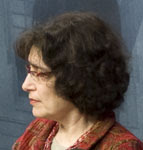 U.S. journalists “are by and large dying for the opportunity to go overseas and learn about a whole range of issues, from refugees to human rights,” but often lack the support of their editors—the “gatekeepers”—to do so, said Louise Lief, deputy director of the International Reporting Project (IRP), at a February 26, 2009, event, “
U.S. journalists “are by and large dying for the opportunity to go overseas and learn about a whole range of issues, from refugees to human rights,” but often lack the support of their editors—the “gatekeepers”—to do so, said Louise Lief, deputy director of the International Reporting Project (IRP), at a February 26, 2009, event, “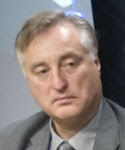
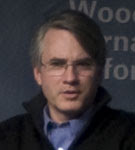 “In a developing country, what is it that moves people, that makes the economy grow?” BusinessWeek’s David Rocks wondered before visiting Uganda.
“In a developing country, what is it that moves people, that makes the economy grow?” BusinessWeek’s David Rocks wondered before visiting Uganda.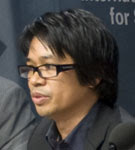
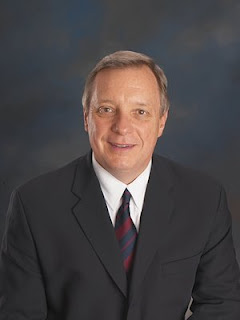 “Water access is no longer simply a global health and development issue; it is a mortal and long-term threat that is increasingly becoming a
“Water access is no longer simply a global health and development issue; it is a mortal and long-term threat that is increasingly becoming a 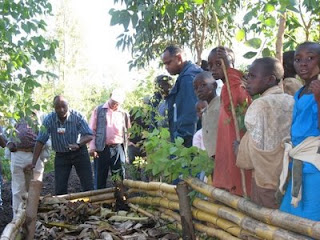 A landlocked, impoverished, densely populated country, Rwanda faces steep challenges in the quest to improve the quality of life of its people, who are mostly small-scale farmers. One solution promoted by the Sustaining Partnerships to enhance Rural Enterprise and Agribusiness Development (
A landlocked, impoverished, densely populated country, Rwanda faces steep challenges in the quest to improve the quality of life of its people, who are mostly small-scale farmers. One solution promoted by the Sustaining Partnerships to enhance Rural Enterprise and Agribusiness Development (

